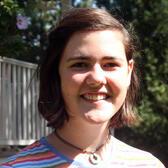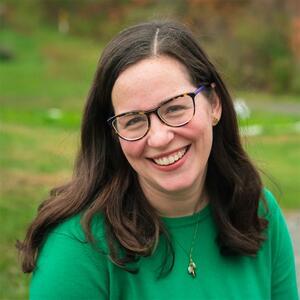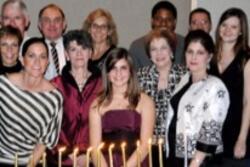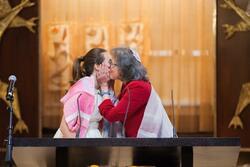My Jewish Studies Teacher Is My Favorite Jewish Feminist
At every school, in every subject, there’s a certain teacher who everyone hopes to see on their class list in the fall. At Gann Academy in Waltham, Massachusetts, in the Jewish Studies department, that teacher is Amy Newman. I’ve been lucky enough to have her two years in a row, making me the object of much envy from my peers, but she is truthfully one of the most exceptional educators I’ve ever met. Amy is incredibly knowledgeable, gracious, and funny, and she makes a sincere effort to let her students into her life and teaching process as much as she can.
She begins and ends every semester with an open-ended class in which she answers questions posed by her students. The questions can be about pretty much anything: how she became a teacher, what life was like for her growing up, her perspective on a certain Jewish issue, her favorite color… the list goes on. From what I’ve learned in these classes, Amy’s perspective is shaped by her identity as a woman with progressive ideas, and also by her identity as an Orthodox Jew.
Amy challenges many preconceptions about what it means to be an Orthodox woman, and what it means to be a feminist. Her feminism is a core part of her identity, and for her, it’s just part of being a good person. Amy’s perspective on feminism and Judaism is one of the most powerful and well-constructed beliefs I have ever encountered. She’s of the belief that being both an Orthodox woman and a “modern woman,” means living in a place of tension between thinking that the Torah is authoritative and a model for the most fulfilling life possible, and also acknowledging that it’s her job to figure out how to do that in a way that honors her feminist identity. She hopes to use her feminism in a way that elevates Orthodox communities. I find this sentiment incredibly compelling because it acknowledges room for growth in a centuries-old practice. Being able to recognize that traditional Judaism holds unique truth and value, and also that it contains teachings that are outdated, shows both reverence for tradition and commitment to progress, and I find that inspiring.
Amy also says that people often ask her if it’s even possible to be both a feminist and an Orthodox Jew. In fact, Amy’s own mother distanced herself from the Orthodox community in which she grew up, and raised her children outside of Orthodoxy, because she felt it was too contradictory to her own feminist identity. When Amy joined the Orthodox community, and as she continues to live an Orthodox lifestyle, she struggles with the reconciliation of these two building blocks of her identity. While I’m not an Orthodox Jew, I also struggle with bringing together my Jewish and feminist identities.
On the whole, I find my Judaism and my feminism to be compatible. I’m a deeply religious person, but I’m not extremely observant. My personal Jewish practice does not feel restrictive to me in any way. However, because I go to a pluralistic Jewish day school, I’m lucky enough to be friends with many different kinds of Jewish people, and I am constantly expanding upon my Jewish knowledge. Every so often I’ll learn about certain Jewish practices that feel offensive and restrictive to me. For instance, no matter which way it’s spun, I have trouble considering the Jewish law that forbids men from listening to a woman sing to be anything but sexist. When I hear about Jewish practices like this, I struggle with the idea that Judaism, which is such a cornerstone of my identity, has laws that so directly contradict my feminism.
To the question of whether or not it’s possible to be both a feminist and an Orthodox Jew, Amy says that she often wonders if people in more progressive communities are better feminists than her, and if there’s a deeper, more consistent feminism to be found in these denominations. Often, she says, she thinks the answer is yes. She concedes that she may compromise a part of her feminism by continuing to be Orthodox. At the same time, she believes that there may be something courageous about being a feminist in an environment where there is resistance to that identity. This isn’t something I had thought about before, and it gives me a great deal of respect for women in these environments who often have to defend their feminist identities.
Too often, I hear women call other women “bad feminists.” The truth is, the majority of people are simply doing the best they can, and it doesn’t help one's cause to point fingers at those who you think could be doing more. Feminist identity is largely about conflict–conflict between what is expected and what one wishes to do, conflict between what it typically means to be a feminist and one’s own specific and unique feminist identity, and conflict between feminism and other aspects of one’s identity. Amy Newman has managed to form an identity for herself that holds together Orthodox Judaism and feminism. Much of that identity is tension and conflict, but I believe that it takes an incredibly strong feminist to be able to recognize that tension, and be comfortable living in that in-between space. Her story shows me that regardless of the makeup of your identity, tension can actually be an enriching force, and something that helps define who you are.
This piece was written as part of JWA’s Rising Voices Fellowship.








Love this perspective on conflict between Jewish and feminist identities! Very well said